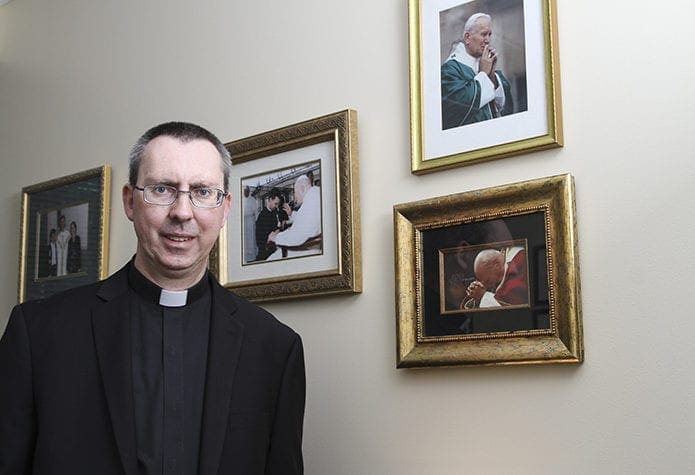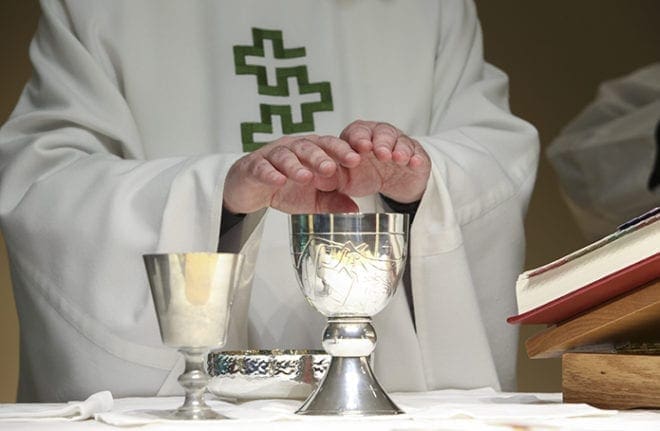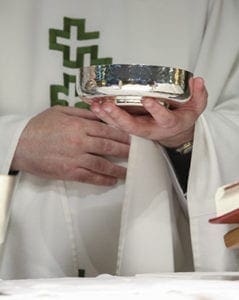 Photo By Michael Alexander
Photo By Michael AlexanderAtlanta
With Parkinson’s diagnosis, priest draws strength from St. John Paul II
By NICHOLE GOLDEN, Staff Writer | Published May 25, 2018
ATLANTA—Photographs of St. John Paul II adorn the walls of Father Paul Burke’s office at the Metropolitan Tribunal. In one picture, a young Father Burke kneels before the Polish pope to receive his blessing.
The priest, chaplain of Our Lady of Perpetual Help Home and promoter of justice for the Tribunal, crossed paths with St. John Paul II several times, never anticipating they would share Parkinson’s disease in common.
“I had always had a devotion to him … now more than ever,” said Father Burke, a native of Ireland.
Father Burke was diagnosed with Parkinson’s disease five years ago at age 42. He has no family history of the disease.
Parkinson’s disease (PD) is a neurodegenerative disorder that affects predominately dopamine-producing neurons in a specific area of the brain. Symptoms develop slowly and the progression varies from person to person. According to the Parkinson’s Foundation, the disease affects one million Americans and 20,600 in Georgia. It occurs more often in men.
“I was having some back issues, and they were looking at possible back surgery,” recalled Father Burke. “The surgeon at the time, he just felt there was something else.”
The surgeon requested another evaluation and a neurological consultation.
Dr. Barry McCasland, neurologist at Emory Saint Joseph’s Hospital made the diagnosis after an evaluation and tests. The method of diagnosis is to place a patient on Parkinson’s medication and if he or she responds, the physician determines a diagnosis of PD.
“They want to see what the response is, and I responded within two weeks. So they knew what was going on at that point,” said Father Burke.
When it came time for diagnosis, the priest wasn’t sure what Dr. McCasland was saying.
“Do I or do I not have Parkinson’s?” Father Burke asked him. “And he said, ‘you do.’ And at that point … a little emotional. He kind of teared up as well.”
Father Burke is grateful that he did not have the back surgery, as it would’ve masked the PD for years. The early diagnosis allowed him to be proactive.
Giving a human face to Parkinson’s
He now asks St. John Paul II for intercession but also looks back upon the pontiff’s life. Father Burke first met him more than 20 years ago at the Vatican.
“I had a private Mass with him back in 1997,” he said.
A good friend of Father Burke’s was priest-secretary for Archbishop John J. Myers, of the Archdiocese of Newark, New Jersey, when the bishop served in Peoria, Illinois. The archbishop arranged the meeting.
“I remember we got the call the night before from now-Cardinal Dziwisz to tell us to be at the Bronze Doors at 6:30 the next morning,” said Father Burke. “When you hear ‘the Bronze Doors,’ you knew exactly what that meant—that you were going in. That was a great blessing.”

Father Burke, a priest for 22 years, said the main effects of the disease center around vision, back problems and short-term memory issues. Photo By Michael Alexander
Father Burke remembers every detail of the private Mass in the chapel.
“It was the Gospel of the Transfiguration. I said it to someone, it was if he (the pope) was on the mountain,” said the priest. “He wasn’t with us, I can tell you that. When they talked about mystical, he was definitely a mystic; no doubt about that. He was gone from us, and he was deep in prayer.”
Following Mass, the guests were brought into the pope’s library. He met them individually and was very engaged with each.
Father Burke swapped his zucchetto for the Holy Father’s and now has the pope’s cap in a relic case.
“Then we chatted, and he said to me, ‘You’re Irish. Be careful of the Celtic Tiger.’”
The Celtic Tiger was the period of prosperity Ireland was experiencing at the time, and St. John Paul II shared that prosperity frequently causes people to lose faith.
“And that was very telling because that is what happened,” said Father Burke.
Although the pope’s secretary tried to move him along, “he wasn’t budging,” said the priest.
Father Burke would meet the pope again on other occasions.
He said the movie “Pope John Paul II,” with actor Jon Voight, is a good depiction. He remembers the scene where the pope is at dinner and notices a tremor in his hand.
“Of course The Holy See never referenced the fact until after his death that he actually had it. I’m not even sure, time wise, when he was diagnosed,” said Father Burke.
Although there were signs, a lot of people thought the symptoms were related to the assassination attempt on the pope’s life.
Despite no direct statement, the pope’s PD symptoms became more marked and obvious to the public.
“… Just the fact that he was determined to the very end, I think that put a human face on it in many respects,” said Father Paul.
The priest decided to share his own diagnosis because he sees a lack of awareness. Many are familiar with the movement symptoms of PD, such as limb rigidity, gait and balance problems, slowness of movement and especially tremors.
But there are many non-movement symptoms of Parkinson’s, including cognitive changes, sleep disorders, weight loss, fatigue, loss of the sense of smell or taste, depression, pain, vision problems and others.
“I won’t say there’s a stigma with it, but you’re self-conscious with it,” said Father Burke. “You just have to remain as natural and normal as you can be. There’re worse things.”
It’s taken time for the priest to reach that perspective. The summer of his diagnosis, his sister and her family came for a visit and he shared the news with them at the beginning of the trip.
“I wanted to show them I could live a pretty normal life,” he said. “I think they were afraid it was something else I was telling them, like cancer or something like that.”
Father Burke transferred into Emory University Hospital and is under the care of Dr. Mario Ravry Sr., internist, and Dr. Jorge Juncos, a neurologist and expert in PD.
“They have a two-day; they call it comprehensive care clinic and you basically go through everything in terms of testing. So you visit with the neurologist, of course, you deal with speech therapists and also with psychologists, a social worker. They evaluate everything and then they come up with a treatment plan that’s tailored to your needs,” he said.
The priest considers Lee and Don Baerwalde of St. Joseph Church, Marietta, and Ellen and Stephen Cocks of Holy Spirit Church, Atlanta, to be his family in Georgia.
“They have been just instrumental. For example, Stephen, he comes to all of the neurologist appointments with me,” said Father Burke.
He said Archbishop Wilton D. Gregory, Bishop Bernard E. Shlesinger III, Msgr. Edward Dillon, of Holy Spirit Church, and Msgr. Frank McNamee, of the Cathedral of Christ the King, have offered tremendous support. He continues to assist at both Holy Spirit and the Cathedral.
Father Burke lives at Our Lady of Perpetual Help Home, and the Hawthorne Dominican sisters who operate the cancer home are like “12 mothers,” he said.
He called the sisters prayer warriors. They keep close contact with his sister about the priest’s progress.
He undergoes speech therapy and physical therapy to help with multitasking.
With PD, it can be difficult to multitask, so therapy exercises can include counting or naming capitals or conducting tasks.
The idea is to monitor disease progression, said Father Burke, and “if possible to slow it.”
He also participated in a six-week speech therapy program, called LOUD.
“One of the things with the disease is it will restrict vocal cords,” he explained. “For people who are older, it is going to be more difficult for them.”
Another challenge of PD is relapsing.
“You can go so well and do so well for a long time, but then all of a sudden you can have a relapse. And so that’s sometimes where the struggle can be,” he said. “That’s what I’m going through at the moment.”
Father Burke is experiencing some new vision problems and will return to the doctor.
The priest’s brother, Pat, died in 2016 of cancer, and he thinks of their last conversation.

With slight tremors in his right hand due to Parkinson’s disease, Father Paul Burke has made adjustments in way he handles items at the altar. Sometimes he may support the right hand or favor the left hand over the right. Photo By Michael Alexander
“My final words with him were that he was very sorry that I had the disease,” he recalled. “I didn’t see him after that. I buried him after that … just the fact that he was thinking of me when he was going toward his own end.”
His own suffering gives him more empathy for the terminal patients served by the Hawthorne Dominicans.
“I’ve never said kind of ‘why?’ The cancer home gives you great perspective,” he said. “Many times they are the ones who are actually ministering to you rather than you ministering to them”
Father Burke asked one patient, Marie, to pray for him, and she responded, “God listens to me when he hears your name.”
“I was completely taken back,” he said.
He never shared his diagnosis from the pulpit but now hopes to educate people that the disease is more than just tremors.
“That’s just one small part of it,” he noted.
An eloquent witness
There is no better role model than St. John Paul II in speaking to the dignity of suffering, the chaplain said.
He recalled the pope’s last public appearance on Easter Sunday 2005.
The pope wanted to talk, “but he wasn’t able to speak and he still came to the window,” said Father Burke.
The world might say you don’t put someone like that in front of the camera, but “our faith says yes, you do,” he said.
“I think that was the most eloquent witness,” said Father Burke and feels “united with him in a way I never thought I would be.”
Father Burke would like to see St. John Paul II become the patron of Parkinson’s patients.
He is also inspired by Cardinal Jean-Louis Tauran, who has PD. The cardinal is president of the Pontifical Council for Interreligious Dialogue, and in a connection, Father Burke is the organizer of Catholic-Orthodox ecumenical gatherings in Atlanta.
There’s one aspect of his treatment that gets him down—the time spent in the Emory waiting room, seeing people in the different stages of Parkinson’s.
“And that can be a little intimidating,” he admitted.
He maintains his independence, closely watches his diet and exercises regularly—all key to health.
“I’m able to drive, and I haven’t been put on any restrictions. They gave me a handicap thing for the car, and I don’t use it,” he said.
Another issue for him is short-term memory.
“You have to be a little more deliberate in how you plan things and where you leave things even,” he said. “I’ve kind of been trained by the sisters, ‘OK, there’s a bowl here, put your keys there. So put them in the same place every day.’”
He finds the best source of materials and information for him has been the Parkinson’s Foundation.
Father Burke celebrates his 22nd anniversary of ordination to the priesthood on May 24 and has enjoyed a variety of assignments in Atlanta. He was ordained by Archbishop John F. Donoghue at St. Brendan Cathedral, Loughrea, County Galway, Ireland.
Father Burke hopes to travel to Belgium next year to defend his doctoral work in canon law at the Catholic University of Leuven. He was asked if he needed special accommodations, but he declined.
“I want to be examined for my work, and I don’t want anything different,” he said.
The priest draws inspiration from St. Rose Hawthorne, St. Therese of Lisieux, St. Josemaria Escriva—but especially St. John Paul II.
“Even though he never wrote about it directly, when you read his letter on suffering, this is a man who speaks from experience—not from theory,” shared Father Burke.
For now the priest focuses on ministry and doesn’t look too far into the future.
“I do what I have to do. I’ll continue to do it and whatever happens, happens. You kind of have to abandon to divine providence and let God be in control,” he said.